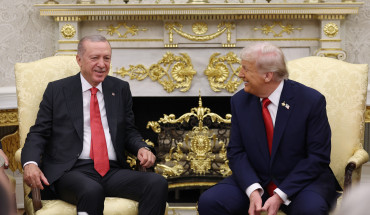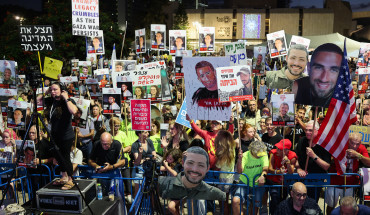While Saudi Arabia hailed the Tuesday meeting between President Donald Trump and Deputy Crown Prince Mohammad bin Salman as a “historical turning point” in U.S.-Saudi relations, the Iranian press expressed the concern that Riyadh and Washington were joining hands to pressure Tehran and undermine the Islamic Republic’s regional agenda. The state-run Pars Today wrote that the main objective of Prince Mohammad’s Washington trip was to depict Iran as the major threat to regional stability. It further argued that Riyadh was trying to strengthen its partnership with and seek assistance from the Trump administration because Saudi Arabia’s “offensive policies” have failed.
Iranian media outlets also discussed a statement released by Prince Mohammad’s senior advisor, who claimed the Saudi and American leaders agreed in the Tuesday meeting that “Iran is trying to establish legitimacy in the Islamic world through supporting terrorist organizations.” Tabnak, an Iranian outlet affiliated with former Islamic Revolution Guards Corps (I.R.G.C.) commander Mohsen Rezaei, called the allegations “baseless” and instead blamed Washington and Riyadh for the instability in the region.
Tasnim, an I.R.G.C. mouthpiece, also warned the Trump administration against intervening militarily in the Yemeni conflicts – adding that such a move would cause immense human suffering in Yemen and would not benefit America. The state-controlled Islamic Republic of Iran Broadcasting (IRIB) opined that the deputy crown prince’s trip showed Washington was reassessing its relations with Riyadh to confront the Iranian agenda in the region. Fararu, another Iranian news site, also argued that relations between Washington and Riyadh, which it claimed had soured under the Obama administration, are expected to improve under the new administration in Washington.
Comment: The Saudi government’s recent outreach to the Trump administration, Muslim-majority countries in the Asia-Pacific region and regional states has deeply alarmed Tehran. Similar to Prince Mohammad’s trip to Washington, the Iranian government and media have been closely monitoring Saudi King Salman bin Abdulaziz’s high-profile Asia tour. Iran’s Foreign Ministry reacted angrily earlier this month to a joint statement by Saudi and Malaysian leaders in which they had criticized Iran’s destabilizing role in the Middle East. The Iranian media has also been warning about the creation of a “NATO 2” regional alliance against Tehran; and the recent visit by the Saudi foreign minister to Baghdad has added to Tehran’s anxieties.
The Middle East Institute (MEI) is an independent, non-partisan, non-for-profit, educational organization. It does not engage in advocacy and its scholars’ opinions are their own. MEI welcomes financial donations, but retains sole editorial control over its work and its publications reflect only the authors’ views. For a listing of MEI donors, please click here.













